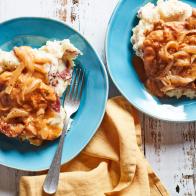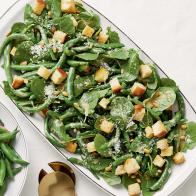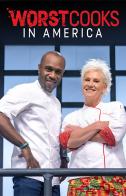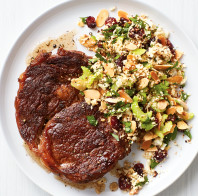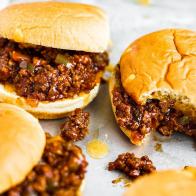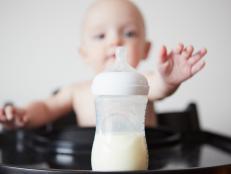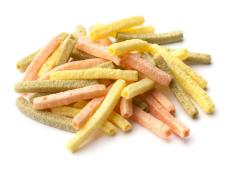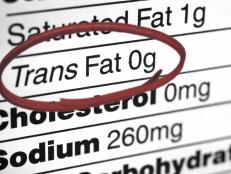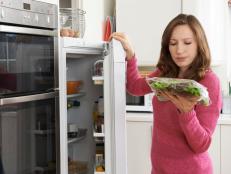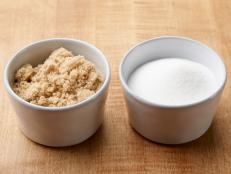What Is the BRAT Diet?
If you're still reaching for bananas, rice, applesauce and toast when you aren't feeling well, you should know that experts no longer recommend this diet for tummy trouble. Here's what they say you should be eating instead — and why.
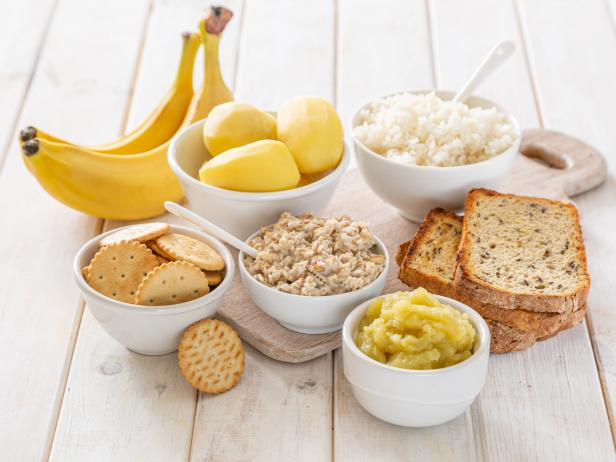
a_namenko
The “BRAT” (bananas, rice, applesauce and toast) diet was a recommendation decades ago for children or adults suffering from diarrhea. Find out why this diet is no longer recommended and what the latest recommendations are when you’re having tummy trouble.
What Is the BRAT Diet?
Besides bananas, rice, applesauce and toast, other foods recommended on the BRAT diet include clear broth soups (like chicken or vegetable), apple juice, water, non-caffeinated tea, canned peaches and pears, sweet potatoes, crackers, cream of wheat, eggs, and gelatin. These foods were recommended to adults and children experiencing diarrhea because they’re gentle on the stomach and lower in fiber. Foods to avoid on the BRAT diet include dairy, alcohol, fried foods, pork, salmon, sardines, raw veggies, citrus fruit like lemons and limes, tomatoes, extremely hot or cold beverages, coffee and caffeinated beverages like soda, and added sugars and sweets.
The theory behind the BRAT diet was to give the digestive system a break by consuming easily digestible, bland foods that also encouraged the formation of firm stool. The thought was that regular foods would make the diarrhea worse. However, these recommendations are no longer being given — here’s why.
Why the BRAT Diet Isn’t Recommended
In the late 1990s, the American Academy of Pediatrics (AAP) moved away from recommending the BRAT diet because it lacked nutrients, specifically fiber, fat and protein. More research came about showing that children with diarrhea can handle regular food without any issues — plus, a regular diet provides better nutrition, so the child or adult can get the nutrients they need to heal.
A 2003 report published by the Centers for Disease Control and Prevention (CDC) notes the BRAT diet is extremely restrictive and provides suboptimal nutrition. In addition, the report notes that following the BRAT diet for too long (more than a couple of days) can ultimately lead to malnutrition.
The Current Recommendations
For children or adults with diarrhea, there are other recommendations now in place based on the latest research. When it comes to mild, short-term cases of diarrhea, the AAP recommends monitoring dehydration. As such, an electrolyte mixture made for children, like Pedialyte, is recommended in order to keep the child hydrated. The AAP strongly recommends against making your own homemade mixture, as Pedialyte (and such electrolyte mixtures recommended by your doctor) are created with a specific ratio of minerals to help with hydration. Once dehydration isn’t a primary concern, then the child should eat whatever they can tolerate. Sugary foods, like candy and soda, and fried foods may irritate the stomach and are best avoided at this time. If a child has severe diarrhea (defined as watery bowel movements every one to two hours or more) and signs of dehydration, it’s recommended you call your pediatrician immediately.
For adults, the recommendations are similar: First rehydrate with an electrolyte beverage, then resume a normal diet, avoiding fried foods and those high in added sugar. However, if it’s a chronic case of diarrhea, a registered dietitian nutritionist (RDN) should be consulted in order to find the etiology of the issue and tailor an intervention plan based on the diagnosis. You can find a RDN in your area by going to the Academy of Nutrition and Dietetics website.
Bottom Line
The BRAT diet is an old-school recommendation for children and adults dealing with diarrhea, but it’s extremely restrictive and lacks adequate nutrients. Based on research, newer guidelines have been established and should be followed when you have diarrhea. Always consult your physician if you’re concerned about any health issue you may have.
Toby Amidor, MS, RD, CDN, is a registered dietitian and consultant who specializes in food safety and culinary nutrition. She is the author of The Greek Yogurt Kitchen: More Than 130 Delicious, Healthy Recipes for Every Meal of the Day.
*This article was written and/or reviewed by an independent registered dietitian nutritionist.
Related Links

